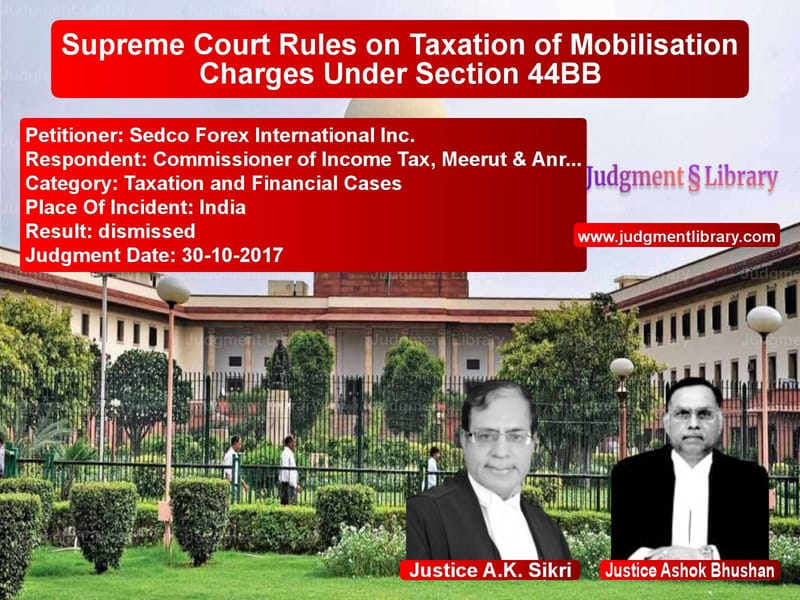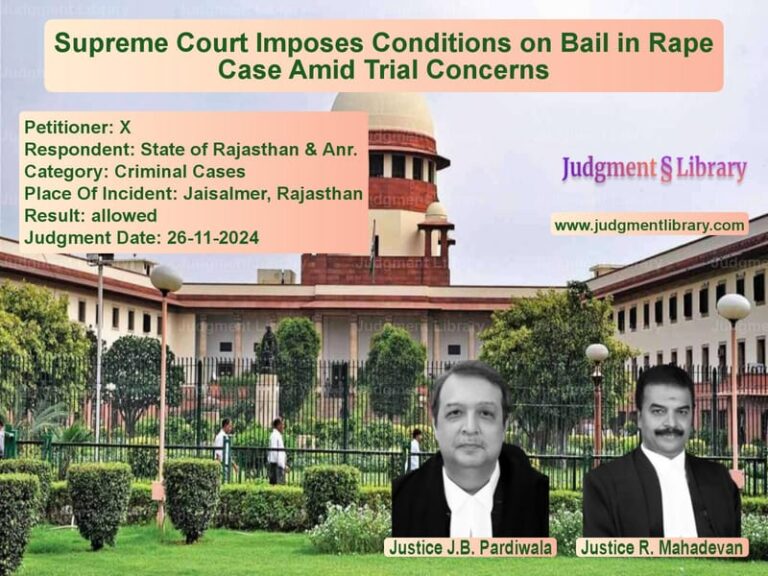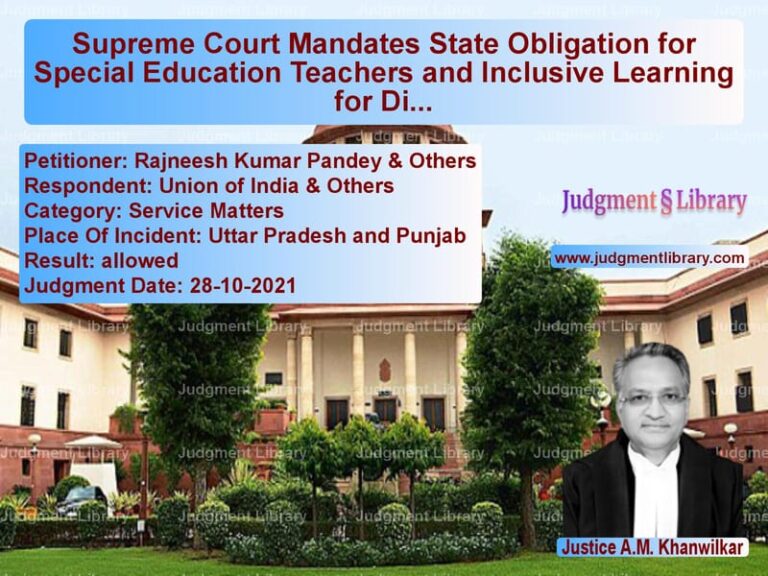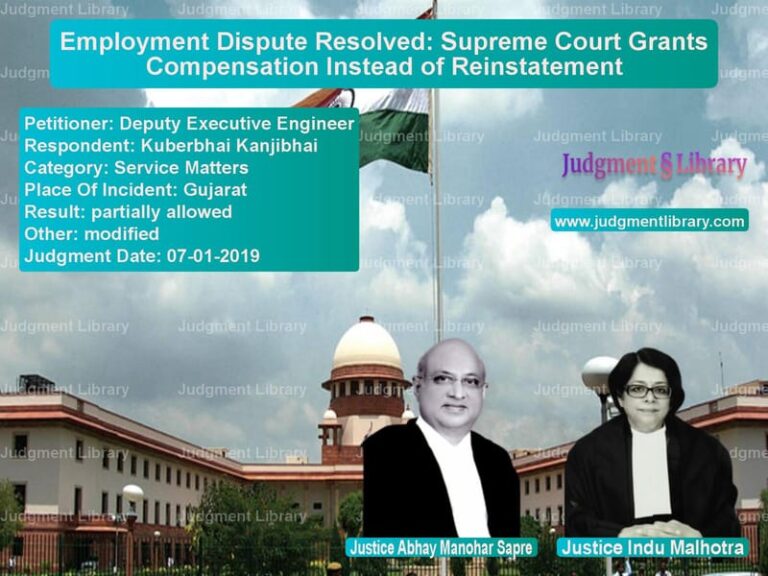Supreme Court Rules on Taxation of Mobilisation Charges Under Section 44BB
The Supreme Court of India recently delivered a landmark judgment in Sedco Forex International Inc. v. Commissioner of Income Tax, which settled a crucial dispute regarding the taxation of mobilisation charges received by foreign companies engaged in oil exploration in India. The ruling provides clarity on the scope and applicability of Section 44BB of the Income Tax Act, 1961, and its impact on non-resident entities operating in the country.
Background of the Case
The case involved the taxation of mobilisation charges paid to non-resident companies that provide services related to the exploration and extraction of mineral oils in India. The dispute revolved around whether mobilisation charges, which are payments made to foreign companies for bringing drilling rigs or other equipment into India, should be included as taxable income under Section 44BB.
The appellant, Sedco Forex International Inc., along with other petitioners, contended that mobilisation charges were mere reimbursements and should not be taxed as income. However, the Income Tax Department argued that such payments were an integral part of the contractual consideration for oil exploration services and should be included in the taxable amount.
Key Legal Issues
- Whether mobilisation charges paid to non-resident companies should be considered taxable income under Section 44BB?
- Whether Section 44BB operates independently of Sections 4, 5, and 9 of the Income Tax Act, which define the scope of total income?
- Whether mobilisation charges received outside India are taxable under the deeming provisions of Section 44BB?
- Whether reimbursement of expenses can be excluded from the total income calculation?
Petitioners’ Arguments
The appellants, represented by senior counsel, contended that:
- Mobilisation charges were merely reimbursements of costs incurred for transporting equipment into India and, therefore, should not be classified as income.
- The payments were made outside India and did not accrue or arise in India under Section 5 of the Income Tax Act.
- Section 44BB is a computation provision and does not override the fundamental principles of taxation under Sections 4 and 5.
- The contractual agreement explicitly stated that mobilisation charges were separate from service fees, and hence, they should not be considered taxable income.
- The ruling of the Uttarakhand High Court, which held that such mobilisation charges should be included in taxable income, was incorrect and should be overturned.
Respondent’s Arguments
The Income Tax Department, represented by Additional Solicitor General, countered these claims with the following arguments:
- Mobilisation charges were not merely reimbursements but part of the overall contractual consideration for oil exploration services.
- Section 44BB applies specifically to the oil exploration industry and provides a presumptive taxation regime that overrides the general provisions of the Income Tax Act.
- Under Section 44BB, all amounts received by a non-resident, whether inside or outside India, are taxable if they are in connection with oil exploration activities in India.
- The legislative intent behind Section 44BB was to tax all receipts related to oil exploration services and not just the direct service fees.
- The High Court’s ruling correctly interpreted the law, and the appeal should be dismissed.
Supreme Court’s Observations
After reviewing the arguments and legal provisions, the Supreme Court made the following key observations:
- Section 44BB is a special provision that applies exclusively to the oil exploration industry and overrides other provisions of the Income Tax Act.
- The term “amount paid or payable” under Section 44BB includes all payments, whether made within or outside India, if they are in connection with oil exploration services.
- The argument that mobilisation charges were mere reimbursements was not tenable, as these payments were made under the contractual arrangement for oil exploration services.
- The High Court correctly ruled that mobilisation charges are part of the taxable income under Section 44BB.
- Even though the payments were made outside India, they were for services rendered in India, and thus, they fall within the scope of taxable income under the deeming provisions of the Income Tax Act.
Final Judgment
The Supreme Court upheld the ruling of the High Court and dismissed the appeals filed by the petitioners. The Court ruled that:
- Mobilisation charges paid to non-residents in connection with oil exploration activities are taxable under Section 44BB.
- Such charges cannot be considered mere reimbursements and must be included in the total income for taxation purposes.
- Non-resident companies engaged in oil exploration in India are liable to pay tax on all receipts related to their Indian operations.
- The interpretation of Section 44BB as a presumptive taxation provision means that it applies to all amounts paid under oil exploration contracts.
Implications of the Judgment
This landmark ruling has several key implications for foreign companies operating in India’s oil and gas sector:
- Expanded Tax Liability: The judgment clarifies that all payments received by non-resident companies in connection with oil exploration activities are taxable in India.
- Clarity on Mobilisation Charges: Foreign companies must now account for mobilisation charges as part of their taxable income and cannot claim them as tax-exempt reimbursements.
- Precedent for Future Cases: The ruling sets a precedent that will impact future tax disputes involving non-resident entities engaged in oil exploration and other similar industries.
- Compliance Requirements: Foreign companies must ensure compliance with Section 44BB to avoid tax disputes and potential penalties.
Conclusion
The Supreme Court’s judgment in Sedco Forex International Inc. v. Commissioner of Income Tax provides much-needed clarity on the taxation of mobilisation charges under Section 44BB of the Income Tax Act. By upholding the taxation of such charges, the Court has reinforced the principle that all payments related to oil exploration services are subject to tax in India. This ruling will serve as a guiding precedent for future cases and ensure uniform application of tax laws in the oil and gas sector.
Don’t miss out on the full details! Download the complete judgment in PDF format below and gain valuable insights instantly!
Download Judgment: Sedco Forex Internat vs Commissioner of Inco Supreme Court of India Judgment Dated 30-10-2017.pdf
Direct Downlaod Judgment: Direct downlaod this Judgment
See all petitions in Income Tax Disputes
See all petitions in Tax Evasion Cases
See all petitions in Banking Regulations
See all petitions in Tax Refund Disputes
See all petitions in Customs and Excise
See all petitions in Judgment by A.K. Sikri
See all petitions in Judgment by Ashok Bhushan
See all petitions in dismissed
See all petitions in supreme court of India judgments October 2017
See all petitions in 2017 judgments
See all posts in Taxation and Financial Cases Category
See all allowed petitions in Taxation and Financial Cases Category
See all Dismissed petitions in Taxation and Financial Cases Category
See all partially allowed petitions in Taxation and Financial Cases Category







